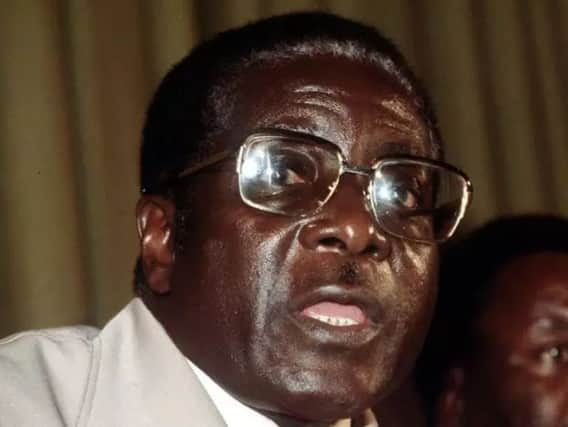"New Zimbabwe could be a beacon for Africa"


Chalk up Zimbabwe as another miserable socialist failure alongside the Soviet Union, East Germany, North Korea, Cuba and, astonishingly, Venezuela where the economy has totally collapsed despite it having the largest oil reserves in the world.
Zimbabwe, too, was once a comparatively rich country, dubbed the ‘bread basket’ of southern Africa, with a fabulously fecund agricultural sector and productive gold and diamond mines.
Advertisement
Hide AdAdvertisement
Hide AdBut that was before Marxist tyrant Robert Mugabe came to power in 1980. In the ensuing decades, Mugabe and his cronies have systematically looted the country’s riches while piling up incredible amounts of personal wealth, including a huge property empire, salted away overseas. Meanwhile, Zimbabwe collapsed to become the world’s second poorest country, with widespread destitution, disease, famine, hyperinflation and collapsing infrastructure, including its health care.
Despite being hailed as a “freedom fighter” by the British left when he took power in 1980, Mugabe quickly displayed his true nature with the brutal suppression of Ndebele people in the west of the country in which up to 20,000 civilians were murdered, often being forced to dig their own graves before being shot in the back of the head.
A few years later, Mugabe turned his thugs on the country’s highly productive white farming community with a series of violent land-grabs that saw the seizure of about 4,000 farms. Not surprisingly, there was a mass exodus of experienced farming families and as a result the agricultural sector, particularly in the highly lucrative tobacco fields, collapsed.
Meanwhile, Mugabe’s clique revelled in their obscene wealth. The dictator’s wife, known as ‘Gucci’ Grace because of her love of expensive designer brands, thought nothing of spending £120,000 on a single shopping trip in Western capitals, while back home her people starved. The couple’s youngest son, Chitunga, recently posted a video on social media showing him pouring a £200 bottle of champagne over a £45,000 diamond-encrusted watch with the boast he could do this because “Daddy runs the entire country”.
Advertisement
Hide AdAdvertisement
Hide AdWhat has happened in Zimbabwe this week is not entirely clear, but it appears that the military has staged a kind of bloodless coup to stop ‘Gucci’ Grace from inheriting the country’s leadership when her 93-year-old husband finally pops his clogs. According to press reports, Mugabe is under house arrest in his mansion, although it isn’t clear whether his wife is with him or has fled the country.
Either way, good riddance to bad rubbish – but of course there is no guarantee that things will get any better for the ordinary Zimbabwean people. The politicians and army officers who have seemingly seized power are precisely the same powerful clique that has sustained Mugabe in power for almost 40 years and who have enthusiastically joined in the pillaging the country’s natural wealth.
If Zimbabwe just swaps one blood-soaked Marxist despot for another, the corruption will simply continue under another name, with no hope of improvement for ordinary citizens.
We know what should happen – socialism and dictatorship should be junked and democracy and free-market capitalism allowed to flourish in their places. Because while socialism has proved to be an abject failure wherever it has been tried, in contrast free markets have proved successful wherever they have been introduced. Once the yoke of state control is lifted and ordinary citizens can freely buy and sell amongst themselves, it unleashes a wave of creativity and results in increases in prosperity that particularly benefit the poor.
Advertisement
Hide AdAdvertisement
Hide AdDon’t take my word for it – look at the hard statistics issued by the World Bank. These facts show that in just 25 years the world witnessed a 74.1 per cent decrease in extreme poverty, not as a result of government aid or the actions of charities and NGOs, but because people were liberated to trade freely with one another.
Wouldn’t it be marvellous if a new Zimbabwe liberated its people and led the way in showing the rest of Africa that free markets can provide a prosperous alternative to the corrupt and poverty-stricken socialist states? For the sake of ordinary Zimbabweans I hope it happens one day.